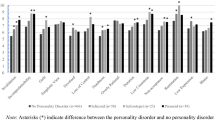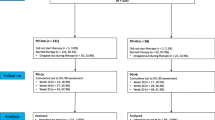Abstract
The aim of this study was to examine the dispositional and/or episodic influences of the process variables of self-understanding, empathy, guided discovery, and convictions about primary early maladaptive schema, which are central concepts in the schema-focused cognitive therapy of personality problems. The sample consisted of 35 patients with panic disorder and/or agoraphobia and DSM-IV Cluster C personality traits who participated in an 11-week inpatient program. Patients, therapists, and an expert observer rated individual therapy sessions. Greater patient-rated self-understanding the first session was related to greater decreases in schema belief and of emotional distress throughout therapy. Greater therapist-rated empathic experience the first session was related to greater decreases in distress throughout therapy. Session-by-session analyses revealed few sequential relationships. However, a greater in-session reduction of schema belief weakly predicted lower level of presessional distress the next session, and vice versa. The study illustrates how to intensively measure and model change in psychotherapy, using both growth curve and time series analyses.
Similar content being viewed by others
REFERENCES
Alden, L. E.,Wiggins, J. S., & Pincus, A. L. (1990). Construction of circumplex scales for the inventory of interpersonal problems. Journal of Personality Assessment, 55, 521–536.
Barber, J. P., Crits-Christoph, P., & Luborsky, L. (1996). Effects of therapist adherence and Competence on patient outcome in brief dynamic therapy. Journal of Consulting and Clinical Psychology, 64, 619–622.
Baron, R. M., & Kenny, D. A. (1986). The moderator- mediator variable distinction in the social psychological research: Conceptual, strategic, and statistical considerations. Journal of Personality and Social Psychology, 51, 1173–1182.
Beck, A. T. (1997). The past and future of cognitive therapy. Journal of Psychotherapy Practice and Research, 6, 276–284.
Beck, A. T., Freeman, A., & Associates. (1990). Cognitive therapy of personality disorders. New York: Guilford.
Beck, A. T., Steer, R. A., & Garbin, M. G. (1988). Psychometric properties of the Beck Depression Inventory: Twenty-five years of evaluation. Clinical Psychology Review, 8, 77–100.
Burns, D. D., & Nolen-Hoeksema, S. (1992). Therapeutic empathy and recovery from depression in cognitive- behavioral therapy: A structural equation model. Journal of Consulting and Clinical Psychology, 60, 441–449.
Burns, D.D., & Spangler, D.L. (2000). Does psychotherapy homework lead to improvements in depression in cognitive- behavioral therapy or does improvement lead to increased homework compliance? Journal of Consulting and Clinical Psychology, 68, 46–56.
Chambless, D. L., Caputo, G. C., Bright, P., & Gallagher, R. (1984). Assessment of fear of fear among agoraphobics: The Body Sensations Questionnaire and the Agoraphobic Cognitions Questionnaire. Journal of Consulting and Clinical Psychology, 6, 1090–1097.
Chambless, D. L., Caputo, G. C., Jasin, S. E., Gracely, E. J., & Williams, C. (1985). The Mobility Inventory for Agoraphobia. Behavior Research and Therapy, 23, 35–44.
Chambless, D. L., & Gillis, M. M. (1993). Cognitive therapy and anxiety disorders. Journal of Consulting and Clinical Psychology, 61, 248–260.
Clark, D. M., Salkovskis, P. M., Hackmann, A., Middelton, H., Anastasiades, P., & Gelder, M. (1994). A comparison of cognitive therapy, applied relaxation and imipramine in the treatment of panic disorder. British Journal of Psychiatry, 164, 759–769.
Cohen, J. (1988). Statistical power analysis for the behavioral sciences (en). Hillsdale, NJ: Erlbaum.
DeRubeis, R. J., Evans, M. D., Hollon, S. D., Garvey, M. J., Grove, W. M., & Tuason, V. B. (1990). How does cognitive therapy work? Cognitive change and symptom change in cognitive therapy and pharmacotherapy for depression. Journal for Consulting and Clinical Psychology, 58, 862–869.
Elliot, R., & Wexler, M. (1994). Measuring the impact of session in process-Experientiel Therapy of depression: The session impacts scale. Journal of Counseling Psychology, 41, 166–174.
First, M. B., Spitzer, R. L., Gibbon, M., & Williams, J. B. W. (1995). Structured Clinical Interview for DSM-IV Axis I Disorders - Patient edition (SCID-I/P) (Version 2.0). NewYork: New York State Psychiatric Institute.
First, M. B., Spitzer, R. L., Gibbon, M., Williams, J. B. W., & Benjamin, L. (1994). Structured Clinical Interview for DSM-IV Axis II Personality Disorders - Patient (SCID-II/P) (Version 2.0). NewYork: New York State Psychiatric Institute.
Hawton, K., Salkovskis, P., Kirk, J., & Clark, D. M. (Eds.). (1989). Cognitive behaviour therapy for psychiatric problems: A practical guide. Oxford: Oxford University Press.
Hoffart, A., & Hedley, L. M. (1997). Personality traits among panic disorder with agoraphobia patients before and after symptom-focused treatment. Journal of Anxiety Disorders, 11, 77–87.
McGinn, L. K., & Young, J. E. (1996). Schema-focused therapy. In P. M. Salkovskis (Ed.), Frontiers of cognitive therapy (pp. 182–207). New York: Guilford.
Monsen, J. T., Odland, T., Faugli, A., Daae, E., & Eilertsen, D. E. (1995). Personality disorders: Changes and stability after intensive psychotherapy focusing on affect consciousness. Psychotherapy Research, 5, 33–48.
Muran, J. C., Gorman, B. S., Safran, J. D., Twining, L.W., & Winston, A. (1995). Linking in-session change to overall outcome in short-term cognitive therapy. Journal of Consulting and Clinical Psychology, 7, 651–657.
Norusis, M. J. (1993). SPSS Trends Release 6.0. Chicago: SPSS.
Orlinski, D. E., Grawe, K., & Parks, B. K. (1994). Process and outcome in psychotherapy—Noch einmal. In A. E. Bergin & S. L. Garfield (Eds.), Handbook of psychotherapy and behavior change (Vol. 4, pp. 270–336). New York: Wiley.
Overholser, J.C. (1993). Elements of the Socratic method: I. Systematic questioning. Psychotherapy, 30(1), 67–74.
Perry, J. C., Banon, E., & Ianni, F. (1999). Effectiveness of psychotherpy for personality disorders. American Journal Psychiatry, 156, 1312–1321.
Persons, J.B., & Burns, D.D. (1985). Mechanisms of action of cognitive therapy: The relative contributions of technical and interpersonal interventions. Cognitive Therapy and Research, 9, 539–551.
Robins, C. J., & Hayes, A.M. (1993). An appraisal of cognitive therapy. Journal of Consulting and Clinical Psychology, 61, 205–214.
Safran, J.D.,Vallis, T. M., Segal, Z.W., & Shaw, B. F. (1987). Measuring session change in cognitive therapy. Journal of Cognitive Psychotherapy, 1, 117–128.
SAS Institute. (1993a). SAS/ETS user's guide. Cary, NC: Author.
SAS Institute. (1993b). SAS technical report P-229. Cary, NC: Author.
Schmidt, N. B., Joiner, T. E., Young, J. E., & Telch, M. J. (1995). The Schema Questionnaire: Investigation of psychometric properties and the hierarchical structure of a measure of maladaptive schemas. Cognitive Therapy and Research, 19, 295–321.
Sexton, H. (1993). Exploring a psychotherapeutic change sequence: Relating process to intersessional and posttreatment outcome. Journal of Consulting and Clinical Psychology, 61, 128–136.
Sexton, H. (1996). Process, life events and symptomatic change in brief eclectic psychotherapy. Journal of Consulting and Clinical Psychology, 64, 1358–1365.
Shrout, P. E., & Fleiss, J. L. (1979). Intraclass correlations: Uses in assessing rater reliability. Psychological Bulletin, 86, 420–428.
Spielberger,C.D. (1983). Manual for the State-Trait Anxiety Inventory (Form Y). Palo Alto,CA: Consulting Psychologists Press.
Tang, T. Z., & DeRubeis, R. J. (1999). Sudden gains and critical sessions in cognitive- behavioral therapy for depression. Journal of Consulting and Clinical Psychology, 67, 894–904.
Teasdale, J. D., & Barnard, P. J. (1993). Affect, cognition, and change: Re-modelling depressive thought. Hove, England: Erlbaum.
Vallis, T. M., Shaw, B. F., & Dobson, K. S. (1986). The cognitive therapy scale: Psychometric properties. Journal of Consulting and Clinical Psychology, 54, 381–385.
Watson, J. C., & Greenberg, L. S. (1996). Pathways to change in the psychotherapy of depression: Relating process to session change and outcome. Psychotherapy, 33, 262–274.
Young, J. E. (1990). Cognitive therapy for personality disorders: A schema-focused approach. Sarasota, FL: Professional Resource Exchange.
Author information
Authors and Affiliations
Rights and permissions
About this article
Cite this article
Hoffart, A., Versland, S. & Sexton, H. Self-Understanding, Empathy, Guided Discovery, and Schema Belief in Schema-Focused Cognitive Therapy of Personality Problems: A Process–Outcome Study. Cognitive Therapy and Research 26, 199–219 (2002). https://doi.org/10.1023/A:1014521819858
Issue Date:
DOI: https://doi.org/10.1023/A:1014521819858




